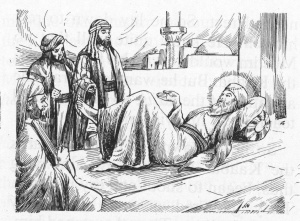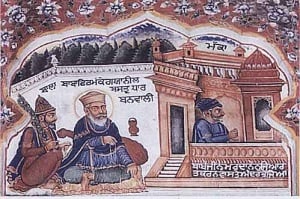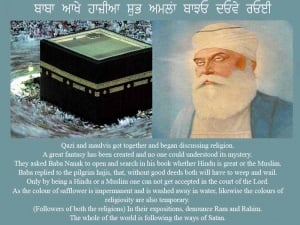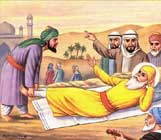Guru Nanak in Mecca
Guru Nanak had been on his Udasis (travels) for at least twenty years. After his sudden disappearance (around 1497) which had alarmed his followers and allowed those who were jealous of his growing influence to start all sorts of mischief, even acusing him of being a thief and stealing from Daulat Khan's stores.
He had visited most of India going to the east as far as Assam and Burma; to the South as far as Sri Lanka (known also as Ceylon and Saran Deep) and to the north he had even crossed the Himalayas visiting Tibet and China. He and his tireless companions had travelled on foot and lived off the land and the generosity of others, Many of whom had become his followers. What a tireless traveller he was!
Though he had travelled long and far, he was not yet satisfied. He now decided to go towards the west in the direction of the setting sun. He turned his attention to the Muslim countries and the places of worship that had been established long before the beginning of Islam. He chose Mecca as the first of the many Muslim countries he would visit. From there he would begin his long walk home. Today everyone knows that Mecca is in Saudi Arabia, but in Guru Nanak's days before Ibn Saud was born the land around Mecca and Medina, the Hijaz, was part of the Mamluk Sultanate centered in Egypt. For hundreds of years it had been a resting place on the trading routes from the East and the Mediteranean. There was a famous ancient well and a temple that had always housed the many idols of the tribes around the city and those of the merchants whose caravans brought wealth to this little desert outpost.
It was the Prophet of Islam Mohammed that cleaned the cube, draped in black curtains with Golden letters, of its many idols as he began his efforts to restore the ancient religion of the area, practised then mostly by the Jews to its earlier ways. He felt that their religion had gone astray and that the many tribes of the Bedouin around him, including his tribe the Quresh, were practising a mishmash of Idolatry, ect.
It was here at the Ka'aba, the ancient cube that the Muslims call the House of God, that Guru Nanak next turned his attention. Guru Nanak, witnessing the way that the men of Babar and the Afgani conquerors before him, had practised their religion on the people of Punjab and India had ample reason to believe that Islam had once again, gone astray.
The Hajj
Each year a pilgrimage, called the Hajj (Arabic: حج,) occurs during the 6th to the 12th day of Dhul Hijjah, in the 12th month of the Islamic calendar. Pilgrims who complete this pilgramage to Makkah and preform its arduous rituals can add the suffix Hajji to their names.
Each person walks counter-clockwise seven times around the Kaaba, the cubical building towards which all Muslims pray each day, kiss the sacred black meteorite mounted on its corner, run back and forth between the hills of Al-Safa and Al-Marwah, drink from the well of Zamzam, go to the plains of Mount Arafat and stand in vigil, then gather pebbles to throw at stone pillars that represent the devil. The pilgrims then shave their heads, perform an animal sacrifice (now it is customary to pay for the cost of the animal and someone else's doing the task), and celebrate the four day festival of Eid ul-Adha.
Guru Nanak's Attire During this Journey
He put on the blue attire worn by hajjis. (Today all male Hajjis must wear a simple two piece white garment of rough homespun cloth.) He took a fakir’s staff, or stick in his hand. The Guru carried a book of his sacred songs or hymns. Like the hajjis, he had with him a iota or jug. He also carried a prayer mat like the hajjis. Dressed thus, he looked like a typical hajji. All along, he acted in every way as hajjis did. Bhai Mardana, a Muslim, was with him he also dressed as a hajji.
Guru Nanak arrived in Mecca, dressed in Navy-blue dress (Neel Bastar) with Bala and Mardana. In the picture Nanak and Bala are having discourses while Mardana is having Ziarat (prayers) inside Mecca. All three are dressed in blue, the colour in which the Fourth Veda was wrapped when brought by Krishna from under the throne of Indra which upon being thrown to earth, is the Ka'aba (by Kahan-nabi). The stool on which Indra rested his feet is also in North Saudi Arabia, a less known shrine. Thus, Nanak dressed in Neela Bana: Neel Bastar lai kaprey pahirey, Turk -pathani amal kiya (adorned navy-blue dress adopting Turki form). Later, as the Tenth Nanak (Guru Gobind Singh), discarded it by saying: Neel bastar lai kaprey faare, Turk pathani amal giya (adorned blue-attire torn, discarding the Turk Pathani form). Out of this form the Nihang sect originated.
It is also said that Baba Nanak used the name 'Abdul Mazeed' when he reached mecca.
Reaching Jeddah, in now Saudi Arabia
Guru Jee then debarked on the Arabian coast at Jeddah. From there, he walked on foot reaching Mecca in due course. By the time he arrived in Mecca, he was very tired. His feet were sore and he needed rest. So he lay down to rest himself. He knew quite well that no Muslim would lie with his feet towards the Kaaba. But he wanted to draw the attention of the hajjis, so that he could teach them his wisdom.
While Muslims hold that Adam landed in Shri Lanka, when expelled from Heaven, they hold that Eve landed in Jeddah a name derived from Jaddah, the Arabic word for "grandmother" or the mother of all mankind.
At Mecca
At Mecca, Nanak was found sleeping with his feet towards the Kaaba, before which the Muslims prostrated themselves when performing their prayer. Kazi Rukan-ud-din, who observed this, angrily remarked: "Infidel! How dare you dishonour God’s place by turning your feet towards Him?" He also kicked Nanak. The Guru did not show any anger. In fact, he was never angry with anybody. He smiled at Jiwan. In a calm, sweet voice he said to him, "Brother, don’t be angry. I am very tired. I need rest. I respect the House of God as much as any one. Please turn my feet in a direction in which God or the House of God is not."
The Qazi took hold of the Guru’s feet. He dragged them in the opposite direction. Then he lifted his eyes. He saw the Kaaba standing in the direction of the Guru’s feet. He turned the Guru’s feet in another direction. The Kaaba was seen standing in that direction. Qazi dragged the Guru’s feet to this side and that. He dragged them round and round. The Kaaba was seen to be going round and round. It was always, in the direction of the Guru’s feet. His feet were always towards the Kaaba. The Qazi was struck with wonder. He then recognised the glory of Guru Nanak.
Kazi Rukan-ud-di and the other hajjis were all filled with wonder. Jiwan let go of the Guru’s feet. The Guru got up and said, ‘Don’t you see that God’s House is in every direction? I tell you He dwells in every place, in every heart. He is in your hearts. He is also in mine.’
Hajjis vs. Nanak
In the morning, a number of learned hajjis gathered around the Guru. They held religious discussions with him. He satisfied every one of them. He explained to them his golden rules of life and religion. They listened to him with utmost attention. They agreed to live and act as advised by him.
The Kazis and the Mullahs assembled to question Nanak on the subject of religion and God, Who has extended His Creation and no one can fathom the secrets of Nature. The muslim priest opened a book and asked him ‘ Who is superior – Hindu or Mullalman.’ Baba Nanak answered ‘Oh Hajis, without performance of good deeds, both Hindu and Muslims will lament. Both will be denied shelter in God’s court on the basis of their respective religions alone. The colour of the flower called Kasumbh (Carthamus Tinctoria) is washed away by water (so labels are fragile). The followers of both religions are quarelling, but of them are equal in the eye’s of God. The world has gone astray as it pursues the path of sin.
On page 193 of Bala's Janam Sakhi, we have: Nanak said, 0: Rukn-ud-Din, hear from me the true reply: the saying of the Lord is written in the Book. That person will go to hell who does not repeat the Kalima, who does not keep the thirty fasts, and does not say the five prayers, who eats what is not lawful for him. These shall receive the punishment and the fire of the bottomless pit shall be his abode.
Nanak said, 0: Rukn-ud-Din, it is written in the Book (i.e., the Quran) that those who drink wine or 'Bhang' shall be punished on the Day of Judgement.
It is also said One of them said to the Guru, ‘Holy Sir, give me something which will always remind me of you.’ The Guru gave him his pair of sandals. They were respectfully kept in the Kaaba for some time. That Muslim fakir then returned to India. He brought the sandals with him. He kept them in his temple at Uch in Bahawalpur, now in Pakistan.
Sau Sakhi
The Karni Namah and the Raj Namah are two significant chapters of the Sau Sakhi, the Sikh book of prophecy. The Raj Namah appears in, The History Of The Sikhs, by J D Cunningham on p. 340. Cunningham came across this document during the mid 19th century. He states that these compositions are of course fabulous as regards Guru Nanak.
The Karni Namah was told to Qazi Rukan Din, Pir Bahaoud Din, Ghous, Kuthab, Saalaar, Hajji, Sheikh and Mushaikh Aulviya, who sat with Guru Nanak at religious discussions. The Raj Namah was told to Kaarun, on Guru Nanak’s return from medina.
Karni Nama
While Guru Nanak was in Mecca and Medina, Qazi Rukan Din asked, ?True King, tell us your prophecy again. Tell us how you will unfold the future?. Your name is Nanak Nirankari and you are from the Nation of the Lord. What are the instructions for the future?
Nanak replied Rukan Din, listen to the true answer Whosoever reads or listens to this shall be content. All doubts shall be removed.
In the tenth dress shall reside The Lord.
I shall fight many battles against Emperor Aurangzeb.
I shall then send a letter of victory (Zafarnamah) to Aurangzeb with my Singh (Bhai Daya Singh).
Upon seeing him, Power shall lessen and he shall forget his devious ways.
Emperor Aurangzeb will be overwhelmed by the sight of Daya Singh and will start to tremble.
The Khalsa been resurrected! Good has not been done by Gobind Singh?
I shall leave having given a kingdom; My name being Gobind
There will be a time when the Khalsa shall forget the teachings I have given them. Sikhi will only be left in name. Many Wars shall occur.
I will have to return again to resurrect the Khalsa. They shall reside in the Punjab.
I shall make people from all four corners into one.
They will be in Majjha; They will raid Lahore.
They will bring Potohaar to justice; They will take Peshawar.
They will set up a cantonment at Attock and then open the Khyber Pass.
They will establish a kingdom in Kabul and then take Ghazni.
After bringing Hazaara to justice they will march on to Kandahar.
After taking Balack and Buckaara, they will conquer Sindh and Baloch.
After gaining victory over these lands they shall govern all the people.
Mecca, Medina and Rome shall tremble.
They shall gain victory in battle over south and west India.
The Guru's Army shall sit at the throne of Delhi.
Umbrellas of kingship shall sway over their heads. All shall be content.
From East to West all shall be conquered. None shall challenge the Khalsa. All humanity shall become one.
In the kingdom of the True King, Satjug shall be established.
The Khalsa Panth shall rule. The arrows of death shall not touch them.
The Army of the Timeless shall grow and spread like locusts.
All shall wear vestments of blue; no one else shall be seen.
Listen Qazi Rukan Din, The Singhs shall rule.
The Unholy Sheikhs shall be destroyed. Pirs and Mureeds shall be no more.
All shall recite the one name of the Lord. Then he shall come himself.
The untrue shall not be able to see his glory.
All humanity shall unite and he will distribute provinces.
The Earth shall give food and the mountains shall give diamonds.
Fruits of many kinds there shall be, upon the sight of the timeless.
All shall recite VAHEGURU and achieve salvation.
Many Dharamsalas (places of discussion) shall exist. The Koran and the Mosques shall vanish.
The Lord shall manifest himself in body (as man).
He will make all utter VAHEGURU. All Singhs shall flock under his banner.
All shall know him as the True One. He will sit at the throne of Delhi.
He will establish a kingdom of peace and no enemies will remain.
Wherever the Khalsa turns his eye, the 14 realms shall tremble.
For 14,000 years, this kingdom shall remain.
Wealth will be collected and food shall be distributed.
The naked and the starving shall all receive; no one will go without.
Sayeth Nanak, Rukan Din, This is how it shall be.
Whosoever reads the Karni Namah, his love with The Lord shall grow.
The Word of the Timeless shall prevail. Those uttering falsehood shall not remain.
After the effect of The Akaal, forests, mountains and the world shall see salvation.
The Khalsa shall Rule. There will be no-one left to oppose them.
All who are lost shall gain the safety of the Khalsa
Raj Nama
Spoken by the First Master
First, Nanak went to Mecca;
Medina he afterwards visited.
The lord of Mecca and Medina,
Kaarun, he made his disciple.
When Nanak was about to depart,
Kaarun, the fortunate, thus spoke:
Now thou art about to go,
But when wilt thou return?
Then the Guru thus answered:
When I put on my tenth dress
I shall be called Gobind Singh;
Then shall all Singhs wear their hair;
They shall accept the 'Pahal' of the two-edged Sword
Then shall the Khalsa be established;
Then shall men exclaim 'Vaheguru'
The four races shall become one and the same;
The five weapons shall be worn by all.
In Kalyug they shall array themselves in vestments of blue;
The name of the Khalsa shall be everywhere.
In the time of Aurangzeb
The wondrous Khalsa shall arise.
Then shall battles be waged,
Endless war shall ensue,
And fighting shall follow year after year.
They shall place the name of Gobind Singh in their hearts.
When many heads shall be rendered up,
The Empire of the Khalsa shall prevail.
First, they shall conquer Punjab;
Then other countries shall be theirs;
Hindustan and the North shall be possessed by them;
Then the west shall bow to them.
When they enter Khorasan,
Kabul and Kandahar shall lie low.
When Iran has been laid prostrate,
Arabia shall be conquered and they shall march on to Mecca.
Mecca shall be beheld,
And Medina shall be seized.
Mighty shall be the rejoicing,
And all shall exclaim 'Vaheguru'.
Unbelievers shall everywhere be destroyed;
The holy Khalsa shall be exalted.
Beasts and Birds shall tremble in the presence of the Lord.
Men and Women shall everywhere call on God.
The Earth, the Oceans and the Heavens shall call on God.
By calling on the Guru shall men be blessed.
Every faith shall become of the Khalsa;
No other religion will remain.
'Vaheguru' shall everywhere be repeated,
And pain and trouble shall depart.
In the Kalyug shall the Kingdom be established,
Which Nanak received from the Lord.
Worthless, I fall before God;
Nanak, the slave, cannot comprehend the ways of the Lord.
Thus replied Nanak to Kaarun's question.
Note the couplets " I shall return to reserect the Khalsa", "All shall wear vestments of blue", "All Sikhs shall flock under his banner." These statements do not hang well with these sects. Their 'Guru' has not reserected the Khalsa so it follows that any second coming of Guru Gobind Singh Ji is yet to come. All shall wear blue, this is one of the colours of the Khalsa, most sects wear white. All Sikhs shall frock under his banner, most Sikhs reject these sects so it cannot be talking about them.
One boat is preserved at Uchch wherein Guru Nanak and Makhdum of Uchch travelled together to Mecca.
Urdu textbook which contained a poem by Iqbal in which he had paid rich tribute to him:.
The land where Chishti delivered the message of truth. The land where Nanak sang the song of God's oneness, The land where the Tatars made their home, The land which lured the Arabs from Arabia, That land is my home, that is my home.
Bhai Gurdas Vaar
Pauri 32 At Mecca
ਬਾਬਾ ਫਿਰਿ ਮੱਕੇ ਗਇਆ ਨੀਲ ਬਸਤਰ ਧਾਰੇ ਬਨਵਾਰੀ ।
Donning blue attire then Baba Nanak went to Mecca.
ਆਸਾ ਹਥਿ ਕਿਤਾਬ ਕਛਿ ਕੂਜਾ ਬਾਂਗ ਮਸੱਲਾ ਧਾਰੀ ।
He held staff in his hand, pressed a book under his armpit, caught hold of a metal pot and mattress.
ਬੈਠਾ ਜਾਇ ਮਸੀਤ ਵਿਚਿ ਜਿਥੈ ਹਾਜੀ ਹਜਿ ਗਜਾਰੀ ।
Now he sat in a mosque where the pilgrms (hajis) had gathered.
ਜਾ ਬਾਬਾ ਸਤਾ ਰਾਤਿ ਨੋ ਵਲਿ ਮਹਰਾਬੇ ਪਾਇ ਪਸਾਰੀ ।
When Baba (Nanak) slept in the night spreading his legs towards the alcove of mosque at Kaba,
ਜੀਵਣਿ ਮਾਰੀ ਲਤਿ ਦੀ ਕੇਹੜਾ ਸਤਾ ਕਫਰ ਕਫਾਰੀ ।
the qazi named Jivan kicked him and asked who was this infidel enacting blasphemy.
ਲਤਾ ਵਲਿ ਖਦਾਇ ਦੇ ਕਿਉ ਕਰਿ ਪਇਆ ਹੋਇ ਬਜਿਗਾਰੀ ।
Why this sinner is sleeping his legs spread towards God, Khuda.
ਟੰਗੋਂ ਪਕੜਿ ਘਸੀਟਿਆ ਫਿਰਿਆ ਮੱਕਾ ਕਲਾ ਦਿਖਾਰੀ ।
Catching hold of the legs he lynched (Baba Nanak) and lo and behold the miracle, the whole of Mecca seemed to be revolving.
ਹੋਇ ਹੈਰਾਨ ਕਰੇਨਿ ਜਹਾਰੀ ॥੩੨॥
All got surprised and they all bowed.
Pauri 33 Discussion with the Qazis
ਪਛਨਿ ਗਲ ਈਮਾਨ ਦੀ ਕਾਜੀ ਮਲਾਂ ਇਕਠੇ ਹੋਈ ।
Qazi and maulvis got together and began discussing religion.
ਵਡਾ ਸਾਂਗ ਵਰਤਾਇਆ ਲਖਿ ਨ ਸਕੈ ਕਦਰਤਿ ਕੋਈ ।
A great fantasy has been created and no one could understood its mystery.
ਪਛਨਿ ਫੋਲਿ ਕਿਤਾਬ ਨੋ ਹਿੰਦੂ ਵਡਾ ਕਿ ਮਸਲਮਾਨੋਈ ।
They asked Baba Nanak to open and search in his book whether Hindu is great or the Muslim.
ਬਾਬਾ ਆਖੇ ਹਾਜੀਆ ਸਭਿ ਅਮਲਾ ਬਾਝਹ ਦੋਨੋ ਰੋਈ ।
Baba replied to the pilgrim hajis, that, without good deeds both will have to weep and wail.
ਹਿੰਦੂ ਮਸਲਮਾਨ ਦਇ ਦਰਗਹ ਅੰਦਰਿ ਲਹਨਿ ਨ ਢੋਈ ।
Only by being a Hindu or a Muslim one can not get accepted in the court of the Lord.
ਕਚਾ ਰੰਗ ਕਸੰਭ ਦਾ ਪਾਣੀ ਧੋਤੈ ਥਿਰ ਨ ਰਹੋਈ ।
As the colour of safflower is impermanent and is washed away in water, likewise the colours of religiosity are also temporary.
ਕਰਨਿ ਬਖੀਲੀ ਆਪਿ ਵਿਚਿ ਰਾਮ ਰਹੀਮ ਕਥਾਇ ਖਲੋਈ ।
(Followers of both the religions) In their expositions, denounce Ram and Rahim.
ਰਾਹਿ ਸੈਤਾਨੀ ਦਨੀਆ ਗੋਈ ॥੩੩॥
The whole of the world is following the ways of Satan.
Pauri 34 Victory at Mecca
ਧਰੀ ਨੀਸਾਨੀ ਕਉਸਿ ਦੀ ਮਕੇ ਅੰਦਰਿ ਪੂਜ ਕਰਾਈ ।
Wooden sandal (of Baba Nanak ) was kept as a memory and he was woshipped in Mecca.
ਜਿਥੈ ਜਾਇ ਜਗਤਿ ਵਿਚਿ ਬਾਬੇ ਬਾਝ ਨ ਖਾਲੀ ਜਾਈ ।
Go anywhere in the world, you would not find a place bereft of the name of Baba Nanak.
ਘਰਿ ਘਰਿ ਬਾਬਾ ਪੂਜੀਝ ਹਿੰਦੂ ਮਸਲਮਾਨ ਗਆਈ ।
Without discrimination of Hindu or Muslim, in every house, the Baba is revered.
ਛਪੇ ਨਾਹਿ ਛਪਾਇਆ ਚੜਿਆ ਸੂਰਜ ਜਗ ਰਸਨਾਈ ।
When the sun rises it cannot be covered and it lightens the whole world.
ਬਕਿਆ ਸਿੰਘ ਉਜਾੜ ਵਿਚਿ ਸਭਿ ਮਿਰਗਾਵਲਿ ਭੰਨੀ ਜਾਈ ।
When the lion roared in the jungle the flocks of deer ran away.
ਚੜਿਆ ਚੰਦ ਨ ਲਕਈ ਕਢਿ ਕਨਾਲੀ ਜੋਤਿ ਛਪਾਈ ।
If someone wants to conceal moon by putting before it a platter, it cannot be hide.
ਉਗਵਣਹ ਤੇ ਆਥਵਣੋ ਨਉ ਖੰਡ ਪਰਿਥਮੀ ਸਭ ਝਕਾਈ ।
From rising to setting directions i.e from east to west, all the nine divisions of earth bowed before Baba Nanak.
ਜਗਿ ਅੰਦਰਿ ਕਦਰਤਿ ਵਰਤਾਈ ॥੩੪॥
He diffused his power in whole of the world.
- See also Guru Nanak: Mecca was Vedic
References
- Macauliffe, M.A (1909). The Sikh Religion: Its Gurus Sacred Writings and Authors. Low Price Publications. ISBN 8175361328.
- Picture from the book: Stories from Sikh History, Book 1 by Hemkunt Press, A-78 Naraina Industrial Area, Phase-1 New Delhi-110028. Authors: Kartar Singh and Gurdial Singh Dhillion. Edited by P.M. McCormack




